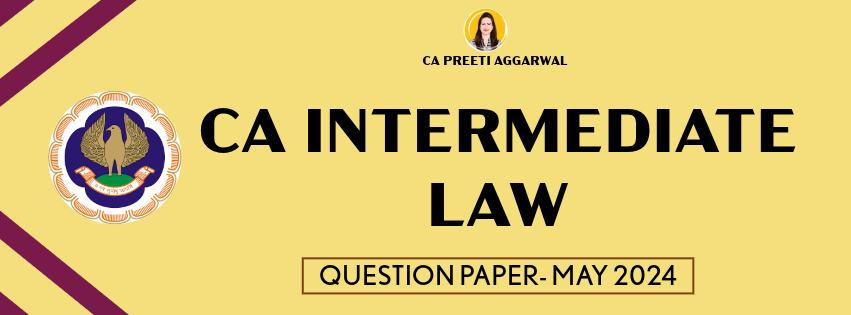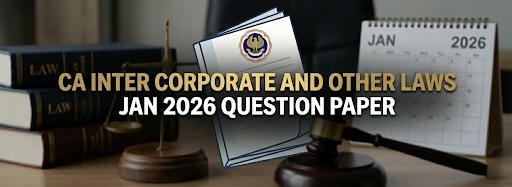CA Inter Law Question Paper- May 2024 exam

This paper will give CA Inter Students an idea about the new paper pattern for CA Inter Law (ICAI New syllabus). It will also help you to know weightage of chapters and the type of questions asked.
CA Inter Corporate and Other Laws Question Paper – May 2024
The question paper comprises of two parts, Part I and Part II
- Part I comprises of Multiple Choice Questions (MCQ’s) for 30 marks. Answers for these questions are to be marked on the OMR sheet only.
- Part II comprises of questions which require descriptive type answers. Answers to questions in this part are to be written in the descriptive type answer book. Answers to MCQ’s, if written in the descriptive type answer book, will not be evaluated.
Question paper comprises of 6 questions. Q1 is compulsory and any 4 out of the remaining 5 Questions.
Q1) (a) MNO Limited has the following equity share capital-
| Class-1: Equity Share Capital- 3,00,000 equity shares of ₹10 each
(1 voting tight for every 1 share) |
₹30,00,000 |
| Class-2: Equity Share Capital- 50,000 equity shares of ₹10 each
(1 voting right for every 5 share) |
₹5,00,000 |
At the time of issue, the company had fulfilled all the conditions related to the issue of equity share capital. The company wants to vary the voting rights of class 2 equity share capital- 1 voting right for every 5 shares to 1 voting right for every 10 shares. The company’s MOA and AOA have given the company the power to make this variation. The holders of 40,000 equity shares have given their consent in writing for this variation. Out of dissenting shareholders, the holders of 4500 equity shares want to apply to the Tribunal against the company’s action. Examine, with reference to the relevant provisions of the Companies Act, 2013-
(i) Whether company can change the rights of its shareholders?
(ii) Whether the dissenting shareholders can apply to the Tribunal? (5 marks)
(b) BBQ Ltd., with its registered office in Hyderabad has two branch offices one located in Delhi and the other in London. The accounting transactions of the branches are recorded and all books of account are maintained in the branches. The branch accountant of the Delhi branch sent monthly and the branch accountant of London sent quarterly summarized trial balance, profit and loss account and balance sheet to the Hyderabad office. One of the assistants of the audit team, Mr Naveen, raised the issue that the branches of the company maintained its books and records at branches, so it defaults on not maintaining the proper books of account at the registered office. Mr. Naveen further objected to the fact that the London branch sent their summarized returns on a quarterly basis instead of a monthly basis. You are requested to analyse and decide the validity of maintaining the books of account and sending summarized returns thereof to the registered office by the branch offices of the company referring to the provisions of the Companies Act, 2013. (5 marks)
(c) Mr. L was employed as a fashion designer Elegant Textile Ltd., a public limited company in Gurugram, India during the financial year 2023-24. He had efficiently provided his services for 183 days during the above said. On 01.04.2024 Mr. H, the human resource manager of Jeff Fashion Ltd., Paris (a foreign country) offered him a better employment opportunity in such company. On 02.04.2024 Mr. L left India for taking of employment as a production controller at Jeff Fashion Ltd., in Paris. On 03.04.2024 he flew back to India for a 10 day family vacation in Manali, India. In light of the provisions of the foreign exchange management act, 1999 elucidate: the residential status of Mr L-
(i) On his return for attending the family function on 30.04.2024.
(ii) In case, instead of vacation, he joins and employment in an Indian company after arriving on 30.04.2024 (4 marks)
Q2 (a) Referring to the provisions of the Companies Act, 2013, answer the following queries:
(i) What is the type of resolution to be passed and maximum number of persons to whom an offer by private placement in a financial year be made?
(ii) Explain the consequences of non-allotment of shares within the stipulated timeline.
(iii) In case the shares were allotted within the requisite allowed time, when can the company start utilizing the funds received by it from such private placement? (5 marks)
(b) (i) In the circumstance where Mr. M and Mr P, joint shareholders of Primal Private Limited holding 500 equity shares, have conflicting views on one special business (related to proposed changes in the AOA) at the extra-ordinary general meeting, Mr. M is endorsing the resolution, and Mr P is dissenting. Determine the procedure for casting the vote in the event of such a situation, as per the guidelines outlined in the Companies Act, 2013.
(ii) Okara Limited, a company, having net worth of ₹110 crores and a turnover of ₹450 crores, wants to accept deposits from the public. Referring to the provisions of the Companies Act, 2013, decide, whether the above company can accept the deposits from the public (2 marks)
(c) (i) The Board of Directors of Cool Private Limited, through a resolution passed in the board meeting, granted authorization to Mr Sharad, the CEO of the company to appoint two employees for the procurement department. Subsequently, Mr Sharad selected Mr Suresh and Mr Hemant for the positions. However, after one month, Mr Sharad noticing unsatisfactory performance and lack of honesty in their duties, issued dismissal orders for both employees, citing proper reasons. Mr Suresh contested his dismissal in the court, arguing that the Board had only empowered Mr Sharad for appointments and not for dismissals and hence the dismissal order is invalid. Assess the validity of Mr Suresh’s argument under the provisions of the General Clauses Act, 1897.
(ii) Mr. A issed a cheque of ₹3,00,000 at 10 a.m to Mr. N as a consideration towards the medical services provided by the latter. Mr. M presented the above cheque on 31.03.2024 during the banking business hours. The cheque was dishonoured taking the plea that it was not presented within the requisite time of 3 months as provided under section 138 of the Negotiable Instruments Act, 1881. Referring the provisions of the General Clauses Act, 1897, decide, whether the plea for dishonouring the cheque was valid. (2 marks)
Q3 (a) “A bonus share is a distribution of capitalised undivided profit having an identity and value capable of being bought and sold first”. In reference to the above line elaborate the prerequisites for issue of bonus shares as enlisted in the Companies Act, 2013. (5 marks)
(b) QL Ltd., is a public listed company incorporated in Surat, Gujarat with 1200 members. On 10.12.2023 a general meeting was convened in which 14 members were present in person. Mr Mohan was acting as an authorised representative of two body corporates who are members of QL limited. Shyam one of the important members was absent. The Chairman Mr. Rahi adjourned the meeting, taking plea of absence of Mr Shyam, to same day and place next week. The members present at the meeting venue waiting to attend, oppose the decision submitting that the majority of them present now shall be unavailable next week. Referring to the provisions of Companies Act 2013 elaborate:
(i) Whether the requisite quorum to hold meeting as required in case of public limited companies is present in this case?
(ii) Whether Mr Rahi could adjourn the meeting in the current scenario? (5 marks)
(c) What are the differences between interpretation and construction in the legal context, and how do these two concepts relate to each other as per Interpretation of Statute? (4 marks)
Q4 (a) Long Boots Ltd. a listed company is engaged in the manufacturing of shoes and related accessories. The business is set on a recovery mode by the induction of the new production manager Mr. A. The Board of Directors of the company has recommended the declaration of a dividend of ₹50,00,000 after a gap of 8 years during which profits were inadequate to distribute the same. The dividend thus proposed is to be met partially out of the current year profit of ₹16,00,000. Accumulated profits during the past 8 years were ₹170 lakhs which is 25% of the total share capital of the company. Referring to the provisions of the Companies Act, 2013, decide whether the conditions with regard to declaration of dividend in case of inadequate profits are met? You are requested to support your answer with requisite calculations. (5 marks)
(b) A dispute among the partners of Limited Liability Partnership (LLP) jeopardized the stability of the business. Out of two partners, one due to a quarrel, left the LLP. The other partner alone continued the business of LLP. Explain the provisions governing the LLP being operated by a single partner and its winding up by the Tribunal as per the provisions of the LLP Act, 2008. (5 marks)
(c) Explain the term “Generalia specialibus non derogant”, in connection with Interpretation of Statutes. (4 marks)
Q5 (a) Stallworth Ltd. is a listed company having all paid up share capital of ₹11 crores with a turnover of ₹100 crores had appointed an Audit Committee which recommended M/s ANC & Associates, a firm of Chartered Accountants having qualifications and experience required for being appointed as the auditor of the company. The next AGM was due on 30.09.2023. The Board disagreed with the said recommendation of the committee and referred it back for reconsideration. The Audit Committee was adamant on appointing the above firm of Chartered Accountants. Discuss in light of the Companies Act, 2013:
(i) The course of action for Board of Directors to resolve the above deadlock. What would your answer be, if above situation was that of filling the casual vacancy of auditors?
(ii) The steps to be taken by the Board of Directors for appointment of auditors in case there was no requirement of Audit Committee in the company? (5 marks)
(b) (i) Explain the protection available for the ‘whistleblowers’ in the context of the Limited Liability Partnership Act, 2008 (3 marks)
(ii) Describe the consequences of making a false statement in any return, statement or other document under Section 37 of the Limited Liability Partnership Act, 2008. (2 marks)
(c) State the provisions of the General Clauses Act, 1897 relating to ‘gender and number’ (4 marks)
Q6 (a) LKJ Ltd., is the company having paid up share capital of ₹12.50 crores with total number of members being 3500. The board of directors have called a general meeting (the meeting) to be conducted on 06.05.2023 at 2 pm. On the date of the meeting the required quorum was not present within half an hour and hence was adjourned to the next week on 13.05.2023 on the same day at same venue. In reference to the above scenario in light of the relevant provisions of the Companies Act, 2013 elucidate upon the following queries of the company:
(i) What will be the fate of the meeting in case two members, in person, were present at the adjourned meeting held on 13.05.2023?
(ii) In case, on 06.05.2023 a total of 16 members were present but the chairman owing to the unruly behaviour of few members during the meeting had adjourned the same to 13.05.2023 and at the adjourned meeting only 3 members, in person, are present. What will be the fate of such adjourned meeting?
(iii) In case, where such meeting was called by the requisitionists under Section 100 of the Act and at such meeting the quorum was not present, what will be the fate of such meeting?
OR
(a) The Income Tax Authority (the statutory body) has gathered some information and is of the view that there has been a manipulation of accounts of FGH Ltd. reflecting an incorrect financial position of the company. The statutory body intends to get the accounts reopened to reflect current financial position of the company. In light of the Companies Act, 2013 elucidate-
(i) the statutory provisions governing the issue of re-opening of accounts by the Income Tax Authority.
(ii) the voluntary revision of financial statements or board’s report by the directors.
(iii) for how many preceding financial years the board of directors may revise the financial statements? (5 marks)
(b) (i) Who will sign the audit report in case of a proprietorship concern or the firm of the auditors and how the qualification/s in the audit report will be dealt with by the auditor at the annual general meeting of the company as per the provisions of the Companies Act, 2013. (3 marks)
(ii) Explain the provisions relating to expert’s consent included in the prospectus to be issued in India by the companies incorporated outside India as per the provisions of the Companies Act 2013. (2 marks)
(c) Explain the rules relating to the remittances made by persons other than individuals requiring approval of RBI as provided in Schedule III to the Foreign Exchange Management (Current Account Transactions) Rules, 2000 issued under the Foreign Exchange Management Act, 1999 in respect of the following:
(i) Commission to the agents abroad for sale of residential flats or commercial plots in India.
(ii) Remittances for consultancy services procured from outside India.
(iii) Remittances by way of reimbursement of pre-incorporation expenses. (4 marks)
CA Preeti Aggarwal offers best CA Online Coaching in India for CA Foundation and CA Intermediate Law. Check CA Study Materials, test series, lectures by best online classes for CA Business and Corporate Law.
The online lectures are as per the latest syllabus of ICAI. Gain confidence in Law and get your doubts solved directly by CA Preeti ma’am.
Best CA Inter LAW classes-
CA Inter Law Full Course May 2025 (New Syllabus- Regular Batch)












